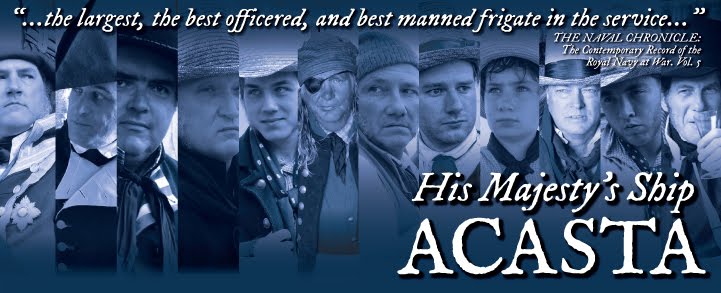On the 1st of June, very early in the morning, the American squadron got under way and stood out to sea; but at nine o'clock, just as they were clearing the Sound, the ships were discovered by the British 74-gun ship Valiant, Captain Robert Oliver, and 40-gun frigate Acasta, Captain Alexander Kerr. The latter gave chase, and the former put back; both parties hauling to the wind under all sail. At about half past one the American squadron bore up for New-London; and the United-States and Hornet, being too deep for their trim, started their water and threw overboard a part of their provisions. At a quarter past two the Acasta, who was far ahead of the Valiant, having got within gun-shot of the United States, fired a bow-chaser at the latter, just as she was rounding New-London lighthouse. The United-States, returned the shot with one from her stern. Instead, however, of bringing-to and trying to cut off the British frigate from her consort, as many of the spectators on shore expected to be done, Commodore Decatur anchored with his squadron in the river.
For several weeks previous to this event, the New York and Boston papers had been filled with panegyrics on their "naval heroes", whose valour they had depicted as impetuous, amounting almost to rashness. Some of the papers, as if a little ashamed of what they said, added "a rasee" to the two British ships, and gave that as a reason why the commodore suffered his squadron to be chased into new London- James's Naval Occurrences, p. 326.
Had boarding been resorted to, the parties would have been nearly equal; thus:
The Acasta, thus left to herself, hauled to the wind and tacked, and soon afterwards, along with the Valiant, anchored of Gardner's Island, distant about twelve miles from New-London. having no persons onboard acquainted with the navigation of the sound, the British ships, particularly the 74, chased with much less effect than they otherwise would. It was not, of course, known to Captain Oliver, that he might even have followed the American squadron into New-London; and that, had the United-States and her companions ascended the river beyond his reach, he might, with little or no risk, have placed the Valiant and Acasta against the town, and blown the houses about the ears of the inhabitants, if they refused to give up the ships.
After having blockaded the American squadron for upwards of six months, the Valiant and Acasta were relieved by the 74-gun ship Ramillies, Captain Thomas Hardy, 40-gun frigate Endymion, Captain Henry Hope, and 38-gun frigate Statira, Captain Hassard Stackpoole. "Tired out at length with his confinement, and the force now before New-London happily excusing him, in the opinion of all, from venturing to cut his way out, Commodore Decatur resolved to put in practice an epistolary stratagem; one that, even in its failure, should rebound to his advantage, by wiping off the impression of lukewarmness, which so many months of forbearance had in some degree attached to his character."
On the 17th of January, 1814, he actually sent to Captain Hardy a written proposition for a contest between the United-States and Endymion, and the Macedonian and Statira. Instead of sending back the "proposition", as one to which the commanding officer of a British squadron could not with propriety listen, Captain Hardy consented that the Statira should meet the Macedonian, as they were sister ships, but, quite the contary, as may be supposed, to the wishes of Captain Hope, refused to permit the Endymion to meet the United-States, because the latter was the much superior force.
From: The naval history of Great Britain:
from the declaration of war by France in 1793 to the accession of George IV
William James



No comments:
Post a Comment